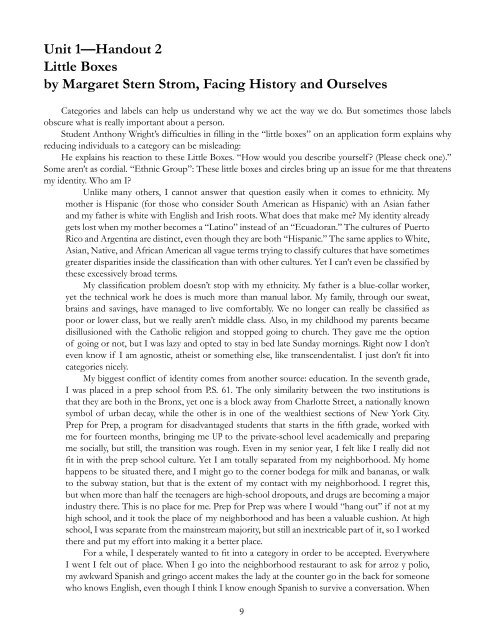Download - Canada ALPHA
Download - Canada ALPHA
Download - Canada ALPHA
You also want an ePaper? Increase the reach of your titles
YUMPU automatically turns print PDFs into web optimized ePapers that Google loves.
Unit 1—Handout 2<br />
Little Boxes<br />
by Margaret Stern Strom, Facing History and Ourselves<br />
Categories and labels can help us understand why we act the way we do. But sometimes those labels<br />
obscure what is really important about a person.<br />
Student Anthony Wright’s diffi culties in fi lling in the “little boxes” on an application form explains why<br />
reducing individuals to a category can be misleading:<br />
He explains his reaction to these Little Boxes. “How would you describe yourself? (Please check one).”<br />
Some aren’t as cordial. “Ethnic Group”: These little boxes and circles bring up an issue for me that threatens<br />
my identity. Who am I?<br />
Unlike many others, I cannot answer that question easily when it comes to ethnicity. My<br />
mother is Hispanic (for those who consider South American as Hispanic) with an Asian father<br />
and my father is white with English and Irish roots. What does that make me? My identity already<br />
gets lost when my mother becomes a “Latino” instead of an “Ecuadoran.” The cultures of Puerto<br />
Rico and Argentina are distinct, even though they are both “Hispanic.” The same applies to White,<br />
Asian, Native, and African American all vague terms trying to classify cultures that have sometimes<br />
greater disparities inside the classifi cation than with other cultures. Yet I can’t even be classifi ed by<br />
these excessively broad terms.<br />
My classifi cation problem doesn’t stop with my ethnicity. My father is a blue-collar worker,<br />
yet the technical work he does is much more than manual labor. My family, through our sweat,<br />
brains and savings, have managed to live comfortably. We no longer can really be classifi ed as<br />
poor or lower class, but we really aren’t middle class. Also, in my childhood my parents became<br />
disillusioned with the Catholic religion and stopped going to church. They gave me the option<br />
of going or not, but I was lazy and opted to stay in bed late Sunday mornings. Right now I don’t<br />
even know if I am agnostic, atheist or something else, like transcendentalist. I just don’t fi t into<br />
categories nicely.<br />
My biggest confl ict of identity comes from another source: education. In the seventh grade,<br />
I was placed in a prep school from P.S. 61. The only similarity between the two institutions is<br />
that they are both in the Bronx, yet one is a block away from Charlotte Street, a nationally known<br />
symbol of urban decay, while the other is in one of the wealthiest sections of New York City.<br />
Prep for Prep, a program for disadvantaged students that starts in the fi fth grade, worked with<br />
me for fourteen months, bringing me UP to the private-school level academically and preparing<br />
me socially, but still, the transition was rough. Even in my senior year, I felt like I really did not<br />
fi t in with the prep school culture. Yet I am totally separated from my neighborhood. My home<br />
happens to be situated there, and I might go to the corner bodega for milk and bananas, or walk<br />
to the subway station, but that is the extent of my contact with my neighborhood. I regret this,<br />
but when more than half the teenagers are high-school dropouts, and drugs are becoming a major<br />
industry there. This is no place for me. Prep for Prep was where I would “hang out” if not at my<br />
high school, and it took the place of my neighborhood and has been a valuable cushion. At high<br />
school, I was separate from the mainstream majority, but still an inextricable part of it, so I worked<br />
there and put my effort into making it a better place.<br />
For a while, I desperately wanted to fi t into a category in order to be accepted. Everywhere<br />
I went I felt out of place. When I go into the neighborhood restaurant to ask for arroz y polio,<br />
my awkward Spanish and gringo accent makes the lady at the counter go in the back for someone<br />
who knows English, even though I think I know enough Spanish to survive a conversation. When<br />
9


